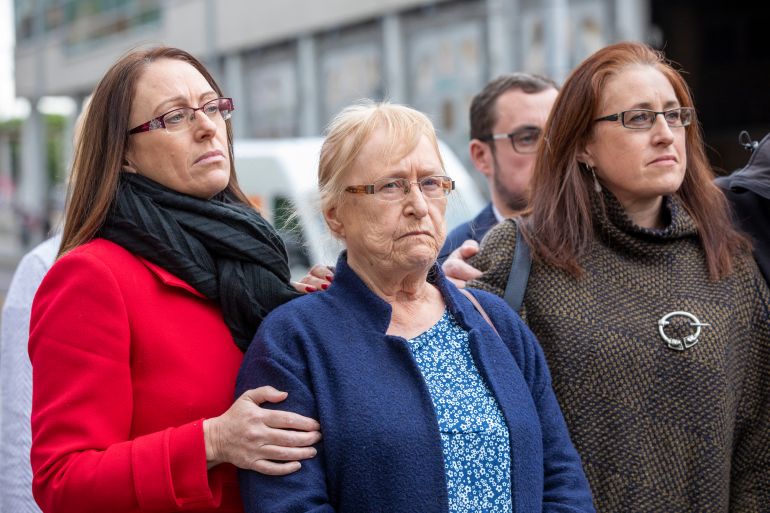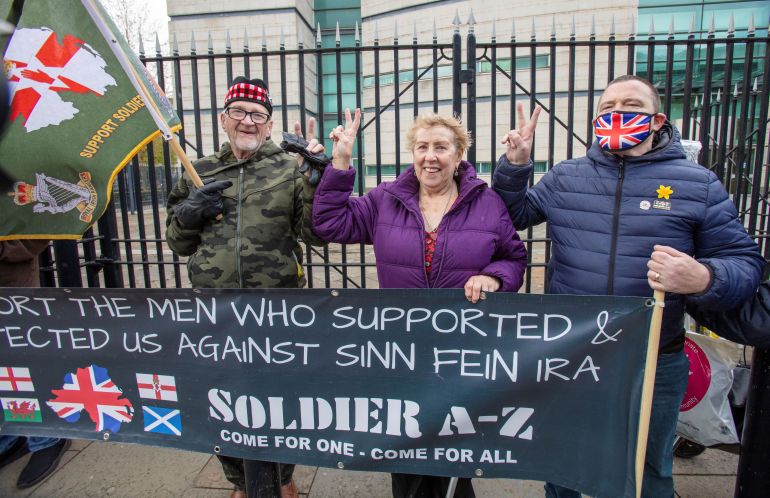UK veterans cleared as 1972 IRA killing case collapses
Two former British soldiers have been acquitted of murdering IRA leader Joe McCann in Belfast, after trial collapses within days of starting.

Two former British paratroopers accused of the 1972 murder of an Official IRA leader in Belfast have been formally acquitted after the veterans’ trial collapsed within days of starting.
The veterans of the Parachute Regiment – made anonymous by court order – were formally cleared on Tuesday at Belfast Crown Court of the shooting of Official Irish Republican Army (IRA) battalion leader Joe McCann.
Keep reading
list of 4 itemsFrom Germany to Ireland, a fresh push to return the Benin Bronzes
Northern Ireland leader Arlene Foster announces resignation
Northern Ireland marks centenary without fanfare as crises simmer
McCann, 24, was evading arrest when he was shot by paratroopers in the Markets area of Belfast in April 1972 at the height of the conflict known as “The Troubles”, when soldiers patrolled streets of the British-ruled province amid fierce sectarian conflict.
The trial of the two veterans, now in their 70s and identified only as A and C, opened last week at Belfast Crown Court. It was the first in several years that involved charges against former military personnel who served in Northern Ireland’s bloody conflict.
Prosecutors on Tuesday could offer no further evidence against the men, after judge John O’Hara decided on Friday to exclude previous statements they made in 1972 and 2010.
The trial started last Monday and had been due to last four weeks. It promised to unpick the messy legacy of British military operations in Northern Ireland.
McCann’s family lawyer Niall Murphy said outside the court on Tuesday that the ruling “does not acquit the state of murder” and that the family plans to apply to the Attorney General for an inquest into the killing.
“This ruling does not mean that Joe McCann was not murdered by the British Army,” he told reporters.
“He was shot in the back whilst unarmed, from a distance of 40 metres, posing no threat. It was easier to arrest him than to murder him.”

Murphy said the family will now ask for the former soldiers to give evidence at a coroner’s inquest and be cross-examined.
Joe McCann’s daughter, Aine, said the criminal justice system had failed in her father’s case as well as for many other families.
‘Should never have happened’
Statements the former soldiers made to the Royal Military Police in 1972 could not be accepted because of problems, including that the defendants were ordered to make them and they were not conducted under caution.
A second source of evidence – statements the two men gave to a police legacy unit in 2010 – was ruled not legitimate.
The judge sided with defence lawyers on Friday, ruling that this evidence was just the 1972 evidence “dressed up and freshened up with a 2010 cover”.
Philip Barden, senior partner at the law firm representing soldiers A and C, said prosecutors should never have proceeded on the case.
He said a senior judge should investigate the decision-making process “to ensure that the decision to prosecute these veterans was not political”.
Legislator Johnny Mercer, who quit as UK veterans minister in protest over slow progress in protecting soldiers who served in Northern Ireland and elsewhere, welcomed the acquittal.
“Should never have happened,” the former British Army officer wrote on Twitter. “Hopefully this marks the lowest point in this nation’s treatment of her veterans.”
“Not guilty”
Should never have happened. Hopefully this marks the lowest point in this Nation’s treatment of her Veterans. Government must act. pic.twitter.com/FTlKbs3e8Z
— Johnny Mercer (@JohnnyMercerUK) May 4, 2021
According to Ulster University’s Sutton Index of Deaths, the British Army was responsible for about 300 killings over the course of operations, which officially ended in 2007.
Six former military personnel have been charged with offences relating to “The Troubles”, according to a UK parliament briefing paper published in February.
The decision to prosecute kindled anger in serving and former members of Britain’s military and has seen the government promise to legislate to prevent further prosecutions.
Prosecutions from the era of “The Troubles” remain fraught with controversy in Northern Ireland, which remains split along sectarian lines despite a 1998 peace deal.
British soldiers arrived in the province on a mission to keep the peace in 1969 but were involved in some of the bloodiest chapters of the conflict, which saw a total of 3,500 people killed on all sides.
Some feel soldiers’ actions were state-sanctioned and legitimate by comparison to shadowy paramilitaries operating among pro-Ireland nationalist and pro-UK unionist communities.
Others feel servicemen should be held to higher standards than paramilitaries and that a blanket amnesty would imply guilt among all soldiers.